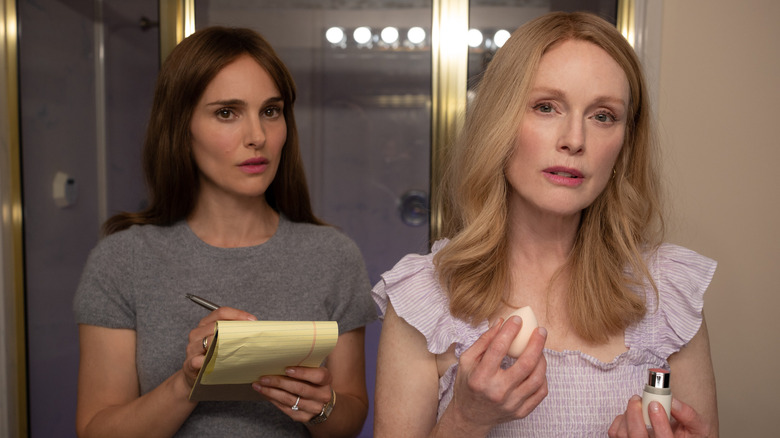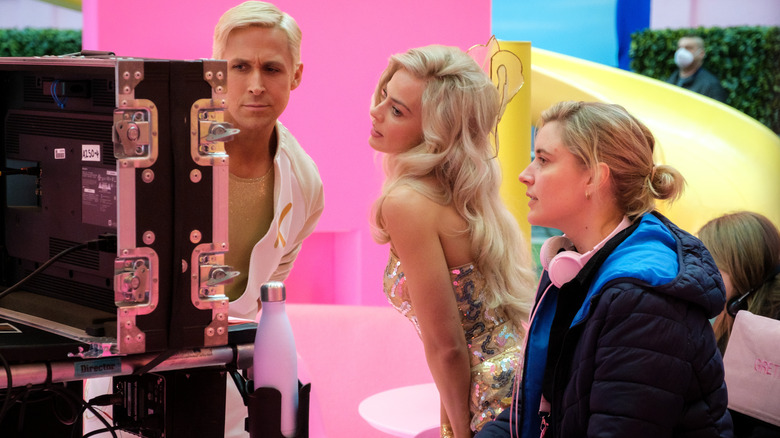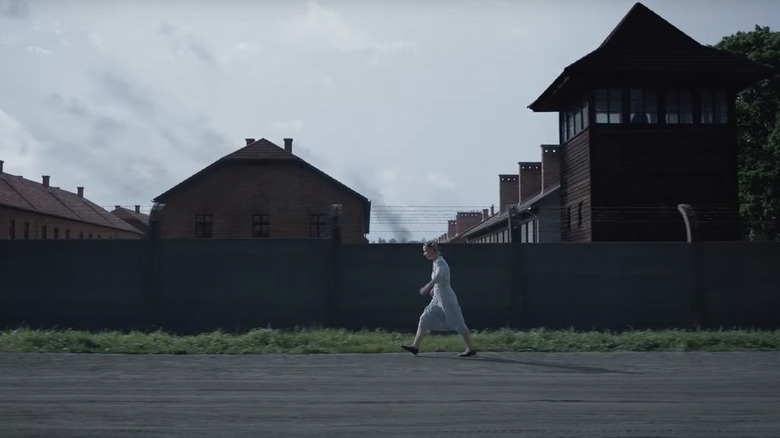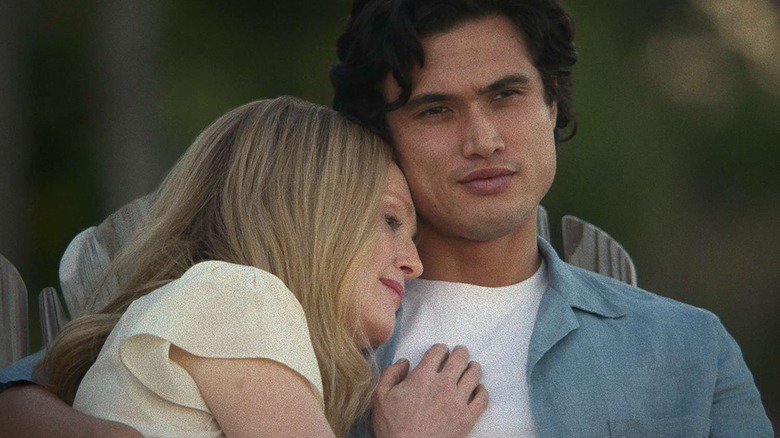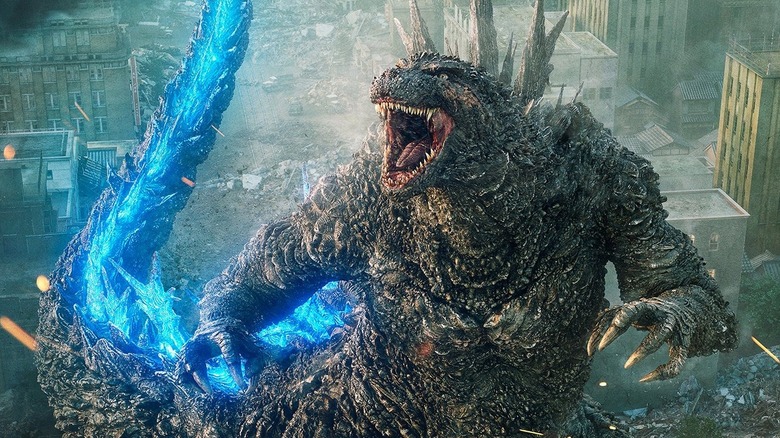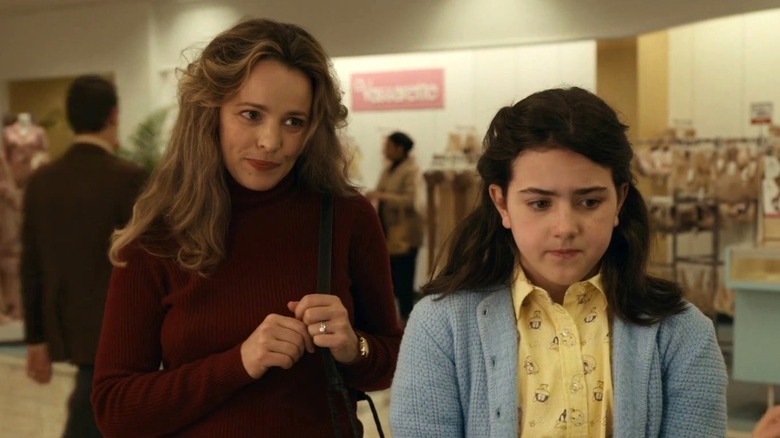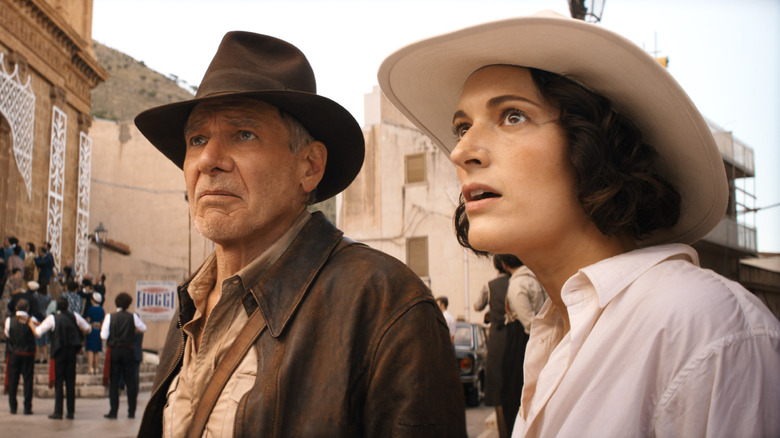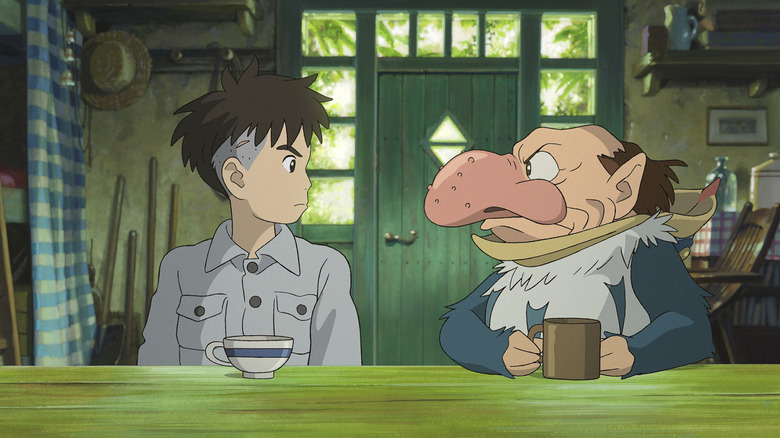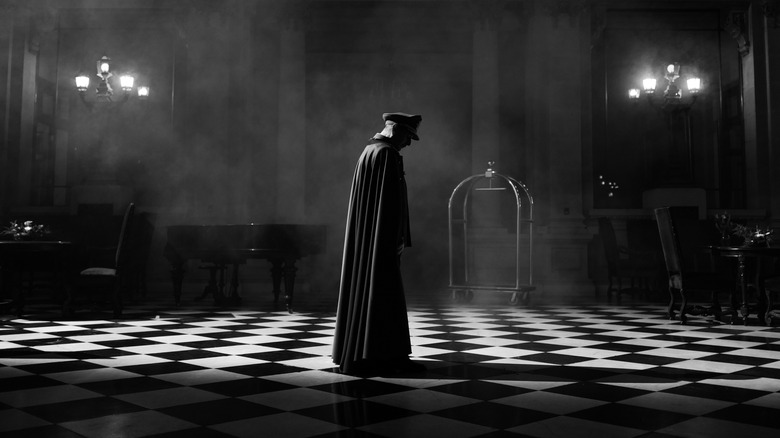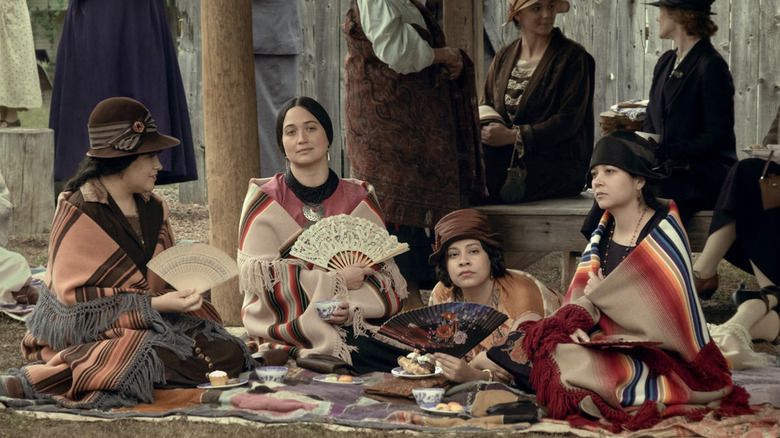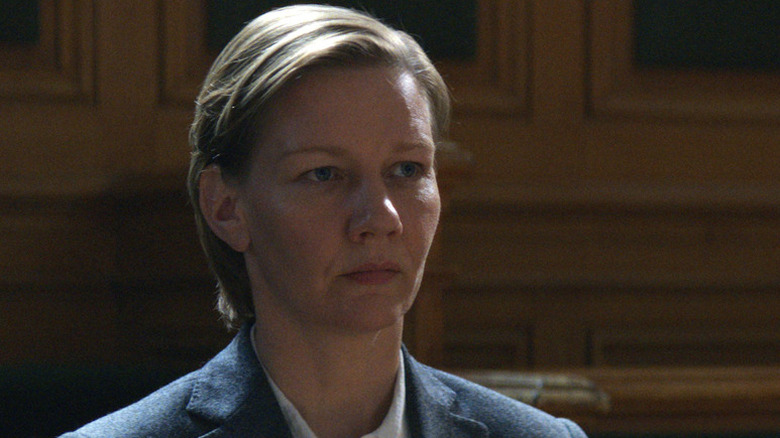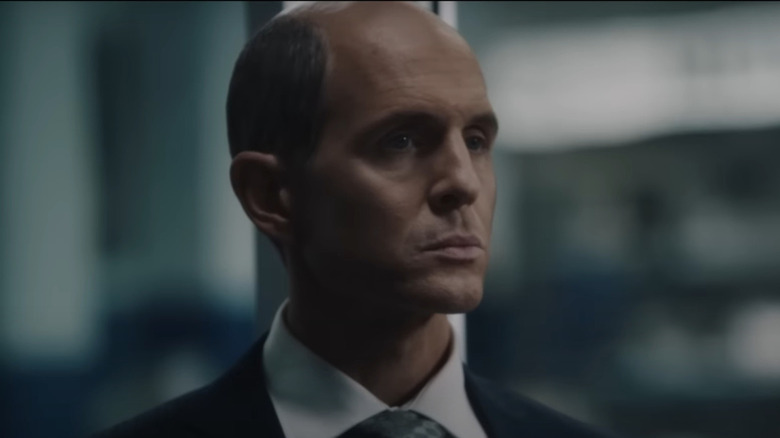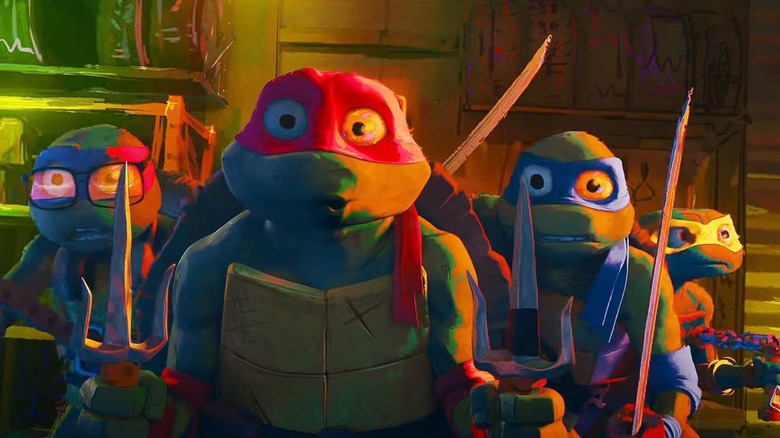The Biggest Snubs And Surprises Of The 2024 Oscar Nominations
Ah, Oscar season. The time of the year where we, as movie fans, act like we're totally not going to get angry and/or excited about the Academy Awards and then proceed to totally get angry and excited about the Academy Awards. That's just how it works. And the nominations for the 96th Annual Academy Awards certainly gave us plenty to get angry and excited about.
The /Film team gathered around our virtual water cooler to celebrate the strange, cool wins that come with these nominations ... and to complain and moan about the movies and performances that were neglected. Is it pointless to assume that a massive voting body like the Academy of Motion Picture Arts and Sciences could somehow go out of its way to snub our favorite movies? Of course. That's just silly. But does it feel satisfying to yell about it? Yes. Always.
Here's what stood out to us in this year's batch of Oscar nominations: the good, the bad, and the ... "Nyad"?
Snub: Somehow, Greta Gerwig and Margot Robbie Didn't Get Nominated For Best Director and Best Actress
Hey, do you guys ever think about dying ... or, at least, the death of the Academy Awards' relevancy these days? Okay, it's maybe not as dramatic as all that, given the fact that "Barbie" still managed to earn a total of eight nominations across a wide range of categories. But as well as the pop culture-defining hit performed in below-the-line nods and some of the more expected ones up top, fans and pundits alike were left scratching their heads over a couple of glaring absences: Greta Gerwig for Best Director and, incredibly enough, Margot Robbie for Best Actress.
Much has been said about the state of the Oscars when it comes to rewarding talented and deserving filmmakers who happen to be women, and /Film's Sandy Schaefer summed it up best right here. Love or hate "Barbie," it's inarguable that even such a blatant IP-grab and essentially a walking, talking toy commercial still managed to bear many of the hallmarks of a Greta Gerwig movie — to say nothing of the creativity, vision, and skill necessary to actually pull it all off with such aplomb. The same certainly goes for Robbie's turn as the title character. She's admittedly playing to the back of the room with such an over-the-top character, sure, but hers is the definition of a magnetic Movie Star Performance. "Barbie" simply wouldn't work without Gerwig and Robbie, both of whom carried this production on their backs. Now we're left to wonder: Why didn't they get their flowers? (Jeremy Mathai)
Surprise: The Zone of Interest's Best Sound Nomination Speaks Volumes
It's rare for restraint and subtlety to be rewarded in the Best Sound category. Bombastic, explosive movies — films with the most sound, not always the best sound — often get recognition. Previous nominees from the past 10 years include films of varying quality, like "The Hobbit: The Battle of the Five Armies," "Mad Max: Fury Road," "Hacksaw Ridge," "Dunkirk," "Dune," and "Top Gun: Maverick." Jonathan Glazer's "The Zone of Interest," aside from being one of the best and most disturbing movies of 2023, is also one of the quietest. This family drama focuses on the German Commandant of Auschwitz, and it's set in a beautiful, sprawling home that butts up against the wall of the concentration camp.
This is not a typical war or Holocaust movie in that it never lingers on the horrific extermination happening inside those walls; instead, Glazer and his sound designer, Johnnie Burn, made the decision to have that element of the film be represented by an omnipresent soundscape consisting of screams, gunshots, torture, and the churning of ovens, consistently belching plumes of smoke into the air. These sounds are always there, always in the background while the Hoss family goes about their day-to-day lives, but they're almost never the dominant aural focus of the scene. They're treated as an annoyance by these characters, when they acknowledge them at all. The fact that they've grown accustomed to sounds of primal human pain and anguish, yet choose not to think about it (let alone do anything about it, aside from actively making the situation worse by adding more people to the camp), is the point Glazer is trying to make. He's clearly drawing a straight line between the past and today, equating those background gunshots to the steady stream of social media posts we're seeing now from genocides and conflicts in different areas of the world. What will you do?, Glazer asks. Will you let these sounds fall into the background of your own life?
Kudos to the sound branch of the Oscars for recognizing this incredible movie in this category. (Ben Pearson)
Snub: May December Got Only One Token Nomination
Apart from a single nomination for Best Writing (Original Screenplay), Todd Haynes' "May December" has been massively overlooked at the Oscars, especially on the performance front. An intense, provocative character study with several stellar performances, "May December" oscillates between darkly comedic and emotionally devastating tones, and this sensitive balance alone is worth a Best Picture or Best Director nomination, given how visceral the experience feels — especially after a second viewing.
There are plenty of performances worth highlighting here, with Julianne Moore and Natalie Portman being brilliant in their own right, but Charles Melton's sobering portrayal of Joe is easily one of the most defining performances of the year. To be able to shine brighter than a cast stacked with veteran actors is no small feat, and Melton achieves this with great nuance by channeling extremely subtle mannerisms that define Joe's unprocessed trauma bursting forth at the seams. Melton's Oscar snub feels even more pointed as he was not nominated at the SAG awards and BAFTAs, although he earned a nomination for Best Supporting Actor at the Golden Globes and Critics Choice Awards.
Apart from Melton, Moore is a standout as well, as her dramatic turn is imbued with a shockingly devastating edge that unravels our understanding of the world that the characters inhabit. Considering that Melton's breakout performance alone warranted at least another nomination for "May December," this already feels like the biggest injustice of the entire 2024 awards season. (Debopriyaa Dutta)
Surprise: Nyad! What the Heck is Nyad?
"Nyad" is a 2023 biopic about professional swimmer Diana Nyad, based on her 2015 memoir "Find A Way." Both the book and film chronicle Nyad's journey to her greatest achievement: swimming 110 miles from Cuba to Florida. Directed by documentary filmmakers Elizabeth Chai Vasarhelyi and Jimmy Chin, the film stars Annette Bening as Nyad herself and Jodie Foster as her coach Bonnie Stoll.
I'm assuming you needed this synopsis because, really, who has seen "Nyad"? The Academy of Motion Picture Arts and Sciences, evidently, for the film just netted two nominations for the 96th Oscars: Bening was nominated for Best Actress and Foster for Best Supporting Actress.
Nyad's real seabound journey is an impressive accomplishment, no doubt, but why has the film (distributed by Netflix) remained anonymous and racked up such prestigious awards attention? Historically, the Academy loves biopics, especially ones with physically transformative performances; Bening in "Nyad" fits. As the voting bloc is actors themselves, they understandably have empathy for performances that scream "Look how hard I'm working."
Plus, Bening and Foster are two of the most widely beloved senior actresses working and it's easy to lump praise on people you already admire; think of how Meryl Streep just has to show up in front of the camera to get awards attention these days. Bening has also been nominated for Best Actress three times prior and won none; we may be well at the stage where any new performance from her qualifies for a lifetime achievement award. (Devin Meenan).
Snub: Leonardo DiCaprio's Career Redefining Killers of the Flower Moon Performance Was Overlooked
In the early days of his career, Leonardo DiCaprio was a heartthrob — a beautiful young man with blonde locks and a devilish grin. Now, as he approaches 50, DiCaprio has become something else. He's still a handsome man, of course, but his looks have hardened, his once smooth, blemish-free face has taken on character. And his acting work reflects that change. With his collaborations with Martin Scorsese, DiCaprio has blossomed into a brilliant actor, one unafraid to play unlikable, challenging characters. With "Killers of the Flower Moon," DiCaprio has delivered his most unlikable character to date — the sniveling, greedy dunce Ernest Burkhart, a murderer who is easily manipulated into poisoning his own wife all in the name of money. It's one of DiCaprio's very best performances — but that didn't seem to interest the Academy, who did not award him a Best Actor nom.
To be clear: Leo will be fine. He's a rich, famous guy who dates young supermodels, and he's already got an Oscar (for "The Revenant," although I think we can all agree the film he should have won Best Actor for was Scorsese's "The Wolf of Wall Street"). Still, it would've been nice to see his work here recognized. All the more so for the fact that Ernest Burkhart was not the part DiCaprio was initially going to play. Instead, the actor was set to portray Tom White, the lawman played in the film by Jesse Plemons. However, DiCaprio reportedly had more interest in the morally dubious Ernest, and his change of character threw the entire production into upheaval — Paramount allegedly balked at backing the film with DiCaprio playing such an unlikable character, and Apple came in to help foot the costs. DiCaprio plays Ernest as a fool — but his foolishness doesn't let him off the hook. Yes, he's dim, but he could easily stand up for himself and his wife if he just took the initiative. Instead, his greed overwhelms him. He loves money, so much so that he's willing to harm his own wife. It's a despicable character, and we have no sympathy for him. It's risky for an actor to play such a part, but DiCaprio sank his teeth into the role, and the Academy should've recognized that. (Chris Evangelista)
Surprise: Godzilla Minus One Stands Alongside the Hollywood Blockbusters
In modern times, the Oscar for Best Visual Effects is often given to big blockbuster movies, ones that take us to different worlds and deliver incredible action and spectacle in photorealistic ways. Movies like "Dune," like "Avatar," like "Gravity." Even when the movies aren't Hollywood franchises, the winners are typically movies with big directors, big stars, and even bigger budgets.
This is what makes "Godzilla Minus One" getting a visual effects nomination all the more surprising and impressive. The film cost a fraction of what a Marvel movie does, but looks just as great. This is not only the first "Godzilla" movie to get an Oscar nod, but also the first non-English-language movie to get nominated for this award since 1970.
This is an acknowledgment that it isn't just Hollywood that can deliver big spectacle. The past few years have seen an explosion in blockbuster genre movies in Asia, with franchises like "The Wandering Earth" making big money with big special effects. This nomination for "Godzilla Minus One" is a step in the right direction of acknowledging the larger world of VFX houses (since most VFX in Hollywood movies are done abroad anyway). As an aside, the fact that the VFX for this movie was made by a team led by director Takashi Yamazaki himself means this is kind of his best director nomination. At least, that's how we're choosing to read it. (Rafael Motamayor)
Snub: Rachel McAdams and Greta Lee, Nowhere to Be Seen
Typically, when an overwhelmingly wonderful performance gets snubbed by the Academy, you can explain it away as an unfortunate outcome in a competitive year. I will not, however, hear this when we're once again talking about the failure to recognize Rachel McAdams as one of the finest actors of her generation. You could argue that she's a victim of the Oscars' snobbish preference for drama over comedy, or that she never stood a chance because Warner Bros. and Netflix failed respectively to mount campaigns for "Game Night" and "Eurovision Song Contest: The Story of Fire Saga," but where the heck was Lionsgate on "Are You There God? It's Me, Margaret?" Kelly Fremon Craig's funny and wise adaptation of Judy Blume's coming-of-age classic gave McAdams a stellar showcase as a mother trying to guide her daughter into young adulthood while struggling through an early midlife crisis of her own. McAdams earned raves for this portrayal, but for whatever reason couldn't break through this awards season.
As for Greta Lee, this one's a real puzzler. Celine Song's remarkably assured first film had been building Oscar buzz lately, and managed to score a Best Picture nomination. Lee's portrayal of a transplanted Korean confronted with unresolved feelings for her first love is the unsettled romantic soul of the movie. If voters were captivated enough to nominate the film, how could they fail to get Lee a Best Actress nod as well? (Jeremy Smith)
Surprise: John Williams? For Indiana Jones 5? Sure! Why Not?
Look, I love John Williams. We all do, right? The man has spent his life composing one audial masterpiece after enough, from the exhilarating scores of the original "Star Wars" and "Indiana Jones" trilogies to the triumphant "Superman" theme, the magnificent "Jurassic Park" theme, the magical "Harry Potter" theme, the haunting music of "Schindler's List," and so on. But I think I can speak for a lot of people when I say that his soundtrack for "Indiana Jones and the Dial of Destiny" is just ... fine. Honestly! I can't think of anything legitimately wrong with it. But I'm also struggling to remember much of anything from it besides its nostalgic reprisals of the leitmotifs from "Raiders of the Lost Ark."
The thing is, I also get it. This could end up being the Academy's final chance to honor the legendary composer (who will turn 92 near the start of February), as much as I hope that he continues to compose film scores for many years to come. But in a year full of extraordinary movie soundtracks by the likes of Trent Reznor and Atticus Ross ("Teenage Mutant Ninja Turtles: Mutant Mayhem") and Joe Hisaishi ("The Boy and the Heron"), it's still kind of baffling that the Academy elected against honoring so many of them in favor of allowing Williams to break his own Oscar record — two of 'em, for that matter. (Sandy Schaefer)
Snub: Animation Music Gets the Shaft as Spider-Verse and The Boy and the Heron Get Snubbed
The Oscars have always had a prejudice against animation. Not only was no single animated movie nominated for Best Picture until 1991, but it is extremely rare that an animated movie gets a nomination outside of Best Animated Feature. The few times that happens, it's always a Disney or Pixar movie, or something comfortably mainstream or ordinary. Even though things are improving a bit — as seen by the stop motion-animated "Pinocchio" winning the Oscar last year — we still have a long way to go.
Case in point: an embarrassing lack of animated movies in the Best Score category. Since the '90s, only two animated movies have won the Best Score Oscar: "Soul" and "Up" — both Pixar movies. This year had a chance to be different. Even if "The Boy and the Heron" is (maybe, possibly) no longer Hayao Miyazaki's last movie, it is a big event, and a movie that features longtime composer's Joe Hisaishi's best score to date. To not nominate him, in what can still probably be the last collaboration between him and Miyazaki, is a huge wasted opportunity.
Likewise, not nominating "Spider-Man: Across the Spider-Verse" outside of the Best Animated Feature category shows a lack of appreciation for the animation medium, as Daniel Pemberton delivers an all-time great musical score. A good score is a good score, no matter how the rest of the movie is presented. So why are the Oscars so afraid of an animated movie getting nominated in this category? (Rafael Motamayor)
Surprise: El Conde's Best Cinematography Nomination is the Definition of Pleasant Surprise
Every now and then, the Academy voters actually get it right. I know that sounds like damning with faint praise (and I totally am, don't get me wrong) but, as much fun as it is to collectively lose our minds over the most galling snubs, it's always worth taking a moment to appreciate the much-needed wins along the way, too. With all due respect to the #OnePerfectShot crowd, there's more that goes into the art of cinematography than vibrant colors, perfect symmetry, and landscape shots. It's all about how the camerawork, lens choices, color palette, and the juxtaposition of images all come together to help tell a story as effectively as possible. And while all the expected picks indeed made the cut, one surprise stands out more than any of the others.
"El Conde" is far from a crowd-pleasing, frontrunner pick in general, which makes it all the more remarkable that the cinematographer branch of the Academy (which, I'd like to believe, tends to skew towards more open-minded individuals than others) opted to include it among the likes of much more obvious favorites. Rendered entirely in black and white, cinematographer Ed Lachman ("Carol," "Dark Waters") washes the film in stark shadows and unsettling framing choices — all of which is fully in service of the satirical story of Chilean dictator Augusto Pinochet as a literal, parasitical, bloodsucking vampire. This might be the most fascinating nomination in years. (Jeremy Mathai)
Snub: Killers of the Flower Moon's Celebrated Script Got Shut Out
It's unusual for a film to score nominations for Best Picture and Best Director, yet miss out on a Screenplay nod. In this case, it's Eric Roth and Martin Scorsese who have curiously gone lacking, though there could be a fairly reasonable explanation for the seeming snub. Roth has made it very plain that his draft of the script essentially told the same tale as David Grann's book. But when Leonardo DiCaprio balked at playing a heroic white federal agent who, along with his white colleagues, sweep into rural Oklahoma to save the Osage people from white predators, the screenplay underwent a massive rewrite that examined the crimes through the eyes of the evil men who committed them and the community they ravaged.
This would've been Scorsese's first Best Adapted Screenplay nomination since 1993's "The Age of Innocence," and it remains to be seen if he'll receive a WGA nod for his work here. If he does, this will be one of the oddest snubs in some time. Right now, it feels like Picture and Director were simply more important to him. (Jeremy Smith)
Surprise: Sandra Hüller, One of the Year's Best Performers, Was Not Overlooked
There are plenty of times Academy voters have ignored some of the best work of the year — especially when it comes to performances in non-English language movies. (See: "Parasite," "Portrait of a Lady on Fire," and dozens of other examples.) But in recent years, as the Academy's voting body has expanded to include more international members, those types of snubs have thankfully become a bit less frequent.
Case in point: While German actress Sandra Hüller was not nominated for Actress in a Supporting Role for her work in "The Zone of Interest," she did receive a nomination for her stellar performance in "Anatomy of a Fall." While it's incredibly unlikely she'll actually beat Lily Gladstone or Emma Stone to take home the Oscar in March, a strong case could be made that Hüller turned in the best performance of any actor or actress in 2023. The way she's able to slip between vulnerability, chiseled resilience, desperation, deep affection, and outright contempt in "Anatomy of a Fall" is nothing short of extraordinary.
"I'm still a licensed forklift driver," Hüller said in an interview with The Hollywood Reporter last year. "That's a real skill. And a bit of job security. I can always work in a warehouse, stacking crates. I'm completely serious. You never know where life will take you." After today's nomination, it's safe to say she won't need to break out her forklift driving skills any time soon. (Ben Pearson)
Snubs: Best Supporting Actor is Just One Big Joke
There are some frustrating snubs in this year's Oscar race, but nothing feels as much like the boring Academy of old than the nominations for Best Supporting Actor. None of the nominated performances are bad, but some of them are certainly much weaker than performances that went unnoticed (from films that went almost entirely unnoticed, at that). It feels criminal to overlook Glenn Howerton's performance as Jim Balsillie in "BlackBerry," a role that allows him to rant and roar to his best ability. No one does rage like Howerton, and in a just world "I'm from Waterloo, where the vampires hang out!" would have cemented him a Best Supporting Actor nomination.
Another great film that got totally snubbed was "The Iron Claw," which should have netted a nomination for Zac Efron at the very least and Holt McCallany as well in a less-crowded field. Efron is absolutely incredible as wrestler Kevin Von Erich, delivering a nuanced performance where he carries tremendous pain in his entire frame but outwardly tries to show people only love. It's heartbreaking, profound stuff, combined with an intense physicality in his boxing scenes that's on par with the all-time greats like Stallone in "Rocky" and Mickey Rourke in "The Wrestler."
The biggest snub is for Charles Melton, whose performance in "May December" is not only one of the best of the year, but perhaps the decade. He manages to convey the trapped adolescence within his character, acting as both an adult man and a preteen boy in the same body, forever wounded by being groomed by an adult woman when he was only 13 years old. All three men deserved nominations, and I'll die mad. (Danielle Ryan)
Snub: Teenage Mutant Ninja Turtles: Mutant Mayhem Got Done Dirty
It may sound silly to say that a "Ninja Turtles" movie was unquestionably one of the better movies released in 2023, but anyone who has seen "Teenage Mutant Ninja Turtles: Mutant Mayhem" is unlikely to put up much of a fight on that front. The film, directed by Jeff Rowe, absolutely cracked the code in regards to this long-running franchise by 1) using animation, which has always been friendly to the heroes in a half-shell and 2) letting the turtles actually be teenagers. The resulting film was everything that modern comic book cinema can and should be, taking the lessons learned from "Spider-Man: Into the Spider-Verse" and running with the ball. Unfortunately, the Academy didn't see it that way and the film was completely shut out at the Oscars.
Sure, the Best Animated Feature category only has five available slots and it's hard to argue against what ended up making it in. But the fact that a movie this good was left out in the cold doesn't sit right. Is it because the members of the Academy felt this movie was just doing the "Spider-Verse" thing through a TMNT lens? If so, that's a painfully reductive way to look at what the filmmakers accomplished here. From the hand-drawn animation style to some of the best action sequences committed to screen in 2023 (regardless of the medium), we're talking about a top-to-bottom stellar film worthy of recognition. The opposite of cowabunga, dudes. (Ryan Scott)
